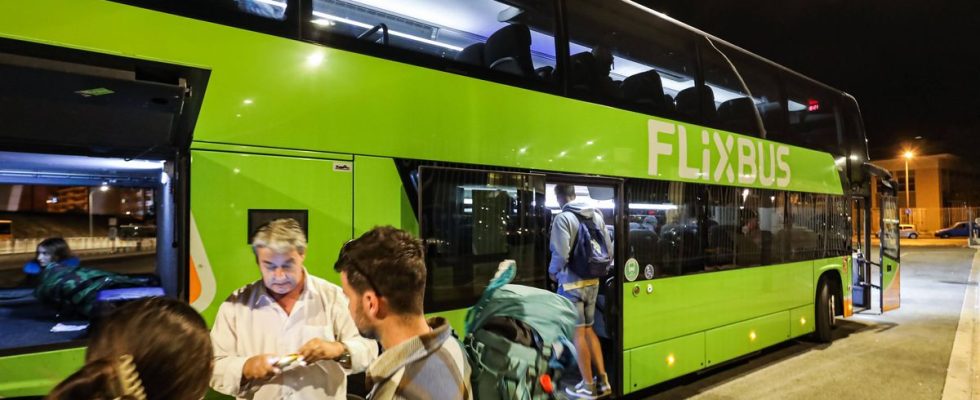At the station Matabiau in Toulouse, this Wednesday, about twenty passengers are taking their troubles patiently because of a delay. This time, not that of a train but of one of those famous “Macron cars” joining Barcelona. Announced at 12:30 p.m., this Flixbus having already crossed France will finally leave at 1:20 p.m. For 47 euros round trip, we can wait a bit…
Suitcases parked in the hold, passengers well settled in their places – only for the lucky ones – it’s off for a six-hour bus ride to the Catalan capital… with Nicolas, Rachid, Thérèse or Sylvie. All are fans of “Macron cars” which with “inflation, the rise in fuel prices and the cost of other means of transport” show a big return of hype, says Charles Billiard of Flixbus. And to affirm: “we have had real success, quite notable since last year, which is also explained by the end of Covid-19 and the strong desire to travel by the French. »
“Comfort-wise, it’s not that bad”
Among them the wise and silent Rashid. Throughout the journey, well wedged at the bottom of the bus, the 78-year-old retiree in a small suit jacket and moccasin will watch the landscape. “I have friends near Barcelona and I visit them very regularly, to their great dismay,” laughs the regular of these round trips by Flixbus. The long hours sitting in a bus? Not much choice, “I couldn’t afford regular train trips. It’s clearly the cheapest and what’s more, in terms of comfort, it’s not that bad,” replies the one who will only carry a sandwich. A snack bought during the only break in the trip to catch up.
Question comfort, we have actually seen worse. We’ve also seen better, honestly. The air conditioning gives off this scent that saves us from the confinement of heavy travel hours, the seats are reminiscent of those of airlines low-cost and the space is more or less livable provided it is not two meters long. Still, the passengers do not seem to ask for the moon. The 47 euros come into play when, on the SNCF side, they would have had to pay nearly 240 euros for the same trip, on the same dates and for only two hours less. “At this price, I hope that the SNCF massages us and brings us petit fours”, laughs Nicolas who goes to the Catalan capital with his mother for a short family stay.
From the top of his 26 years, this graphic designer takes advantage of the journey to rest after a week of celebrations, his face glued to the window of the bus. No offense to his mother, Thérèse, a nurse from the Gers, they will discuss over a drink when they arrive. “For once I’m not driving,” says the mother who is reading a book. In addition, we are not less well seated and we save money. »
Joanne, she keeps busy by rolling her cigarettes in advance while waiting for a break. The intermittent performer from Seine-et-Marne, who has neither a license nor an identity card, loves these Flixbuses which are the “only mode of transport that does not require it when you cross the Franco-Spanish border “.
“We can decide to leave overnight”
Another fan of “Macron buses”? Melanie. Engulfed in her favorite jogging, helmet over her ears, she has planned everything so that these six hours of travel are not too long: “It’s easy to access and for a penniless student like me, it allows me to move easily. I can go more often to see my friends in Paris or take trips without it costing me a kidney. And then I like this roots side perhaps, it’s practical. We can decide to leave overnight. »
Convenient schedules and flexibility have also attracted students, employees, retirees and families who fill this Flixbus en route to Barcelona. Sylvie from Toulouse runs a guesthouse in Spain and goes there every week: “The schedules are much more flexible for me. There are more choices for leaving or arriving somewhere. I don’t need to adapt any more.” The very smiling 50-year-old is a regular and has become accustomed to the vagaries of Macron-style travel. “Sometimes it’s nice, sometimes it’s not. But I have rarely come across the cliché of a bus full of young people who have come to get drunk in Barcelona. It’s always calm. »
And it is in peace that these six hours of road will pass, without traffic jams or ditties. Arrived at 6:30 p.m. at Gare du Nord in Barcelona, everyone gets up a bit stiff, but no more than after taking the train or the plane. If fatigue is present, the feeling of having made a good deal is too. Especially when it now comes to enjoying the Ramblas and tapas.

